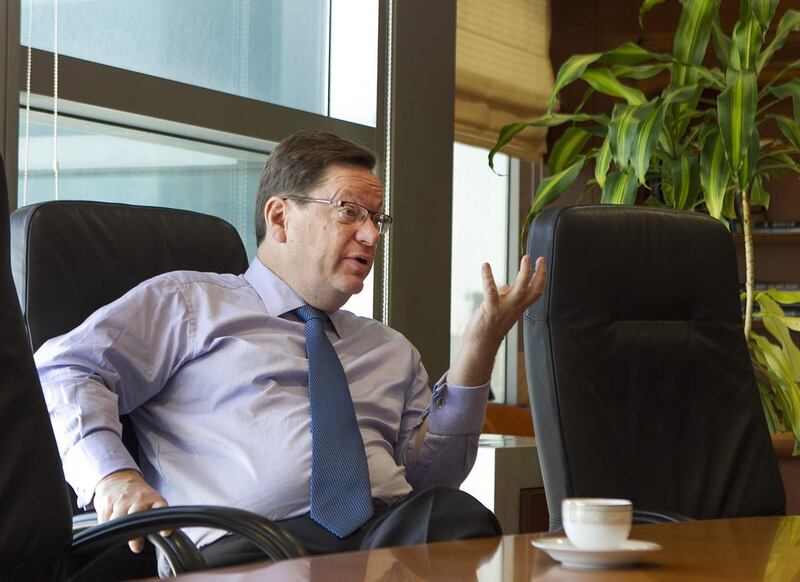Since Alex Thursby became the chief executive at National Bank of Abu Dhabi (NBAD) last year, placards have popped up inside the bank’s headquarters outlining his bold vision to transform the sleeping giant into the leading Arab bank.
And that is only the half of it. Mr Thursby, poached from Australia and New Zealand Bank (ANZ) last summer, also has an ambitious plan for the bank, which has the biggest overseas branch network of UAE lenders, to expand in the “West-East corridor” to tap a US$137 billion commercial banking market.
Here and across the region, he wants to beef up the NBAD’s consumer banking division where many other banks such as Abu Dhabi Islamic Bank and Emirates NBD have been aggressively expanding in search of higher yields from individual customers.
“I think the plan has given people direction,” Mr Thursby, who has been with the bank since July, told The National last month. “I think the rank and file has been very positive. I think the bank now has a certain sense of purpose. You don’t expect people to go and 100 per cent absorb it and understand it immediately.”
UK-born Mr Thursby, 53, is no stranger to big projects. He is credited with leading ANZ’s push into Asian countries including Indonesia, Vietnam and China in his six years prior to joining NBAD. In a career that has included two decades at Standard Chartered, Mr Thursby has made a name for himself as a larger-than-life yet prudent manager who is well acquainted with the lay of the land in Asia. And it is those markets that he now wants to attack again, this time flying the flag of Abu Dhabi.
His business thesis is that while many banks have chosen to focus on particular continents, such as Emirates NBD targeting the Middle East, and Singapore-based DBS focusing on Asia, there are few banks that have attempted to capture inter-continental flow. And Abu Dhabi’s position at the crossroads of three continents makes it the perfect candidate to exploit these flows. Mr Thursby is betting that commodity-hungry emerging markets in Asia and Africa that are industrialising and have huge middle-class growth potential will make those continents areas of high economic growth, although they are out of favour with investors at the moment.
“In our view, the stimulus of Asia and its long-term growth prospects remain and its need of hydrocarbons, agricultural output, investment and output of liquidity, huge industrialisations, a big middle class emerging means these three pieces are very self-aligned and independent,” says Mr Thursby.
“I think many banks are attacking components of it but not many that are joining all of this up.
“It doesn’t necessarily mean being big in all parts of the world. What it means is connecting between the investment flows and trade flows.”
A long-standing Asiaphile, Mr Thursby is an big fan of the region’s cuisine and fine arts, being a collector of the works by Vietnamese and Chinese artists. But most of all, his banking philosophy has a clear Asian stamp on it. The financial crisis that nearly toppled the West’s financial system in 2008 has made him even more certain of the superiority of the Asian way. Having recently read the former US Treasury secretary Hank Paulson’s account of the financial crisis, On the Brink, deepened his respect for Asian thrift, frugality and productivity, even more, he says.
“What I took away from that book is how the West got itself in such a position whereby political expediency destroyed the financial system,” Mr Thursby says.
“It’s why I respect the Asians and their financial system management versus the West. The prudency of the Asian banking system generally and their values are very strong compared to the political expediency, the greed and the inappropriate risk management and political decision making that just snowballed. In 2008, it hit the biggest of walls and the snowball bust.
“The phenomenon of leverage is a western phenomenon of the last 35 years. And what people have to understand is that when leverage goes wrong it has a big negative effect.”
Mr Thursby notes the West used to have thrift but went bad in the 1980s when politicians encouraged people to borrow and live beyond their means. By contrast in Asia, growth has been propelled by consumption from savings and not debt. He also points out debt-free led growth has also taken off in other emerging markets such as Africa and countries such as Chile and Mexico.
The kind of measured risk management Mr Thursby espouses appears to have made him a good fit with Abu Dhabi where change is slow and policy cautious.
In other ways, too, he seems to be well suited to this country after his time in the Antipodes. In recent years the UAE, which has a similar climate to Australia, has attracted top managers from that country such as the chief executive of the capital’s flag carrier Etihad Airways, James Hogan, and Shayne Nelson, the chief executive of Emirates NBD.
And, as in Australia, sport is also very popular here. Sadly for Mr Thursby, though, he says it is hard to find an opportunity to take to the field these days.
“I just don’t have any time any more.”
mkassem@thenational.ae





